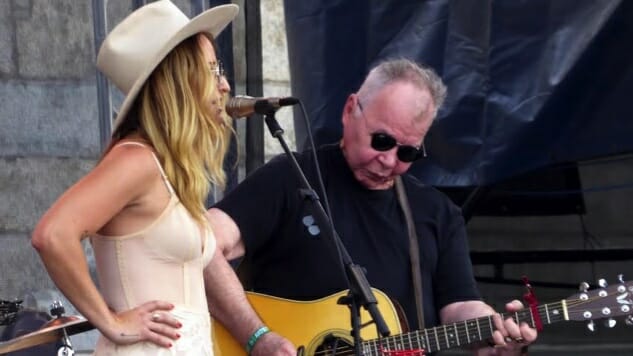The Curmudgeon: Gospel Preaching at the Newport Folk Festival
Photos by Geoffrey Himes
Fantastic Negrito was the first day’s first act on the big stage at this year’s Newport Folk Festival. That’s the nom de musique of Xavier Amin Dphrepaulezz, a very tall man with a high afro atop his head and tightly woven cornrows on the side. Wearing a green silk jacket and baby-blue pants, he wailed in a Prince-like falsetto over funk guitar about a “Scary Woman” whose honesty and independence frightens the male narrator.
This was wonderful stuff, but what did it have to do with America’s folk-music traditions? That question was soon answered when Dhrepaulezz, a Somali-American from Oakland, shifted into black-preacher mode. The pacing, arm-waving, quiet-purring, hoarse-shouting, storytelling, sin-denouncing, hope-proclaiming evangelist is as much a traditional American art form as the guitar-strumming bluesmen or the banjo-picking balladeer.
As Dhrepaulezz began the next song, he cued his backing quartet to tamp down the rock ’n’ roll roar as he acted out an encounter with a woman. She informs her wooer that she’s got no time for a trifling man, because she’s “working three jobs to pay my bills.” Dhrepaulezz then morphed from playing these two characters into a preacher who asked us in the harborside congregation why a woman has to juggle so much to get so little—and what can be done about it.
That set up the rousing song, “Hump Thru the Winter,” which bridged the gap between the preachers he heard as a grade-schooler in Michigan and the Prince records he loved as a teenager in California.
And it set up a three-day festival where performers shifted into preacher mode again and again. It seemed appropriate for an era when health care, free elections, a stable climate, international alliances, even facts themselves are under attack. These musicians didn’t feel it necessary to go through the laundry list of troubles one more time; they were more worried about our response to the daily barrage of bad news. They cautioned against the temptations of pessimism, cynicism and isolation. They preached the secular salvation of coalitions, activism and hope.
At the end of Friday, for example, on the same stage nestled up against the gray stone fortification that gives Rhode Island’s Fort Adams State Park its name, Jason Isbell & the 400 Unit invited David Crosby to join them. After a vocal duet between Isbell and his guest on Crosby, Stills & Nash’s sci-fi anti-war fable, “Wooden Ships,” Isbell turned preacher too. Raising his arms forward, he urged his parishioners to not abandon old songs and old performers who fought the good fight. In times like these, he exclaimed, we need that continuity from past to present to have enough momentum for a better future.

Amanda Shires, Jason Isbell and David CrosbyThat was a set-up for Crosby, Stills, Nash & Young’s “Ohio” with Crosby reprising Neil Young’s vocal lament and Isbell playing Young’s biting guitar attack. “Tin soldiers and Nixon’s coming,” the walrus-mustached Crosby sang; “we’re finally on our own.” It was a useful reminder that there have been bad presidents and bad times before—times when they were actually shooting demonstrators—and they were turned around not when a savior from somewhere else arrived, but when we saved ourselves.
Adam Weiner is a most unlikely preacher. The leader of Philadelphia’s Low Cut Connie is a piano-pounding, hair-tossing, shiny-gold-jacket-wearing wild man in the tradition of Jerry Lee Lewis. But when he stood on his piano bench, after frantically gyrating his pelvis during “Dirty Water,” he got serious.

Adam Weiner of Low Cut ConnieStarting his Saturday afternoon sermon, he declared, “I don’t care about your race; I don’t care about your religion; I don’t care about how much money you have; I love every one of you.” He punched the air with his first on each “I don’t care” and encouraged us to love each other the same way. And how could we resist, bouncing as we were to the groove propelled by drummer Larry Scotton and bassist Lucas Rinz?
Like Weiner, Langhorne Slim stood on the furniture to get his point across. The Pennsylvania singer/songwriter in the straw fedora and white overalls climbed up on the flimsy plastic folding chairs inside the tent Sunday at the Harbor stage and testified to the healing power of love and his determination not to break before hate.
The War and Treaty hasn’t even released its debut album yet, but the duo raised Sunday’s crowd at the Quad Stage, tucked inside the fort, to its feet with a show obviously rooted in black church services. The husband-and-wife team of Michael and Tanya Trotter grew up in that environment, but they applied those worship practices to the celebration of marital pleasures.
-

-

-

-

-

-

-

-

-

-

-

-

-

-

-

-

-

-

-

-

-

-

-

-

-

-

-

-

-

-

-

-

-

-

-

-

-

-

-

-











































